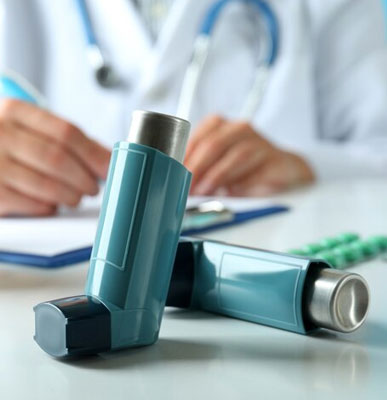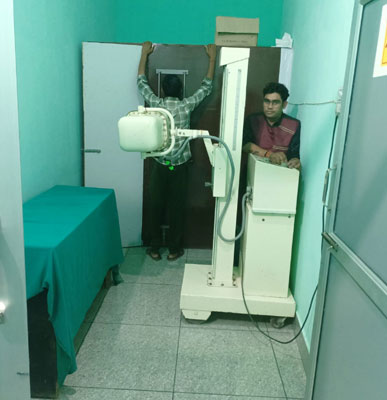
The respiratory system is vital, and any disturbances in its function can have profound effects on overall health and quality of life. At KHUSHI GENERAL AND CHILDREN HOSPITAL, JIND we specialize in advanced care for respiratory conditions, including asthma, ensuring patients breathe easier and live fuller.
Respiratory Conditions: A broad category that includes disorders affecting the lungs and airways, such as chronic obstructive pulmonary disease (COPD), bronchitis, pneumonia, and more.
Asthma: A chronic inflammatory condition where the airways narrow, swell, and produce extra mucus, leading to difficulty in breathing.
Respiratory Conditions: Persistent cough, chest discomfort, shortness of breath, wheezing, and frequent respiratory infections.
Asthma: Recurrent episodes of wheezing, coughing (especially at night), chest tightness, and shortness of breath.
Diagnosis
Pulmonary Function Tests: To assess how well the lungs work.
Chest X-rays and CT Scans: Visual tools to inspect lung health.
Asthma: Spirometry to measure airflow and bronchoprovocation tests to assess airway sensitivity.



Respiratory Conditions: Medications (like bronchodilators and anti-inflammatories), pulmonary rehabilitation, and in severe cases, oxygen therapy.
Asthma: Inhaled corticosteroids, long-acting beta agonists, and leukotriene modifiers. Rescue inhalers for quick-relief during attacks.
Patient-Centered Approach: Customized treatment plans catering to individual patient needs.
State-of-the-Art Equipment: Advanced diagnostic tools and therapies ensure precision in care.
Multidisciplinary Team: Our pulmonologists, respiratory therapists, and nursing staff collaboratively ensure holistic care.
Education and Training: Providing patients and families with knowledge about disease management, inhaler techniques, and trigger avoidance.
Stay Active: Regular, gentle exercises can improve lung capacity and overall health.
Avoid Triggers: Recognize and steer clear of allergens or irritants that exacerbate symptoms.
Clean Environment: Use air purifiers and ensure regular cleaning to reduce indoor allergens.
Stop Smoking: Smoking exacerbates respiratory conditions and increases the risk of complications.
Regular Check-ups: Routine visits to the pulmonologist to monitor and manage conditions.
While respiratory conditions and asthma can pose challenges, they are manageable with the right care and lifestyle adjustments. At KHUSHI GENERAL AND CHILDREN HOSPITAL, JIND our dedication is to empower our patients with the best treatments, knowledge, and support, helping them lead vibrant, active lives.
Overview: Typhoid, a serious infection caused by the bacterium Salmonella Typhi, predominantly spreads through contaminated food or water.
Approach: At KHUSHI GENERAL AND CHILDREN HOSPITAL, our experts utilize precise diagnostic tests for quick identification of typhoid. Depending on the severity, patients are prescribed appropriate antibiotics. Patient hydration and nutrition are also closely monitored to ensure a speedy recovery.
Overview: Dehydration can result from severe or prolonged diarrhea, leading to a significant loss of body fluids and essential minerals.
Approach:Our pediatricians emphasize rapid rehydration, often using oral rehydration solutions (ORS). In severe cases, intravenous (IV) fluids might be administered. The underlying cause of diarrhea is also addressed to prevent recurrence.
Overview: Allergic rhinitis is an allergic reaction that causes symptoms like sneezing, itching, congestion, and runny nose, often triggered by allergens like pollen, dust, or pet dander.
Approach:Our hospital's allergists perform allergy tests to identify the specific allergens affecting the child. Based on the findings, a personalized treatment plan, including allergen avoidance strategies and medications like antihistamines or nasal corticosteroids, is designed.
Overview: Renal colic signifies intense pain resulting from the presence of stones in the kidney or urinary tract.
Approach:Our team employs cutting-edge imaging to detect the exact size and location of the stone. Treatment options may encompass pain relief measures, increased fluid intake, and if necessary, surgical or non-surgical procedures to eliminate or fragment the stone for easier passage.